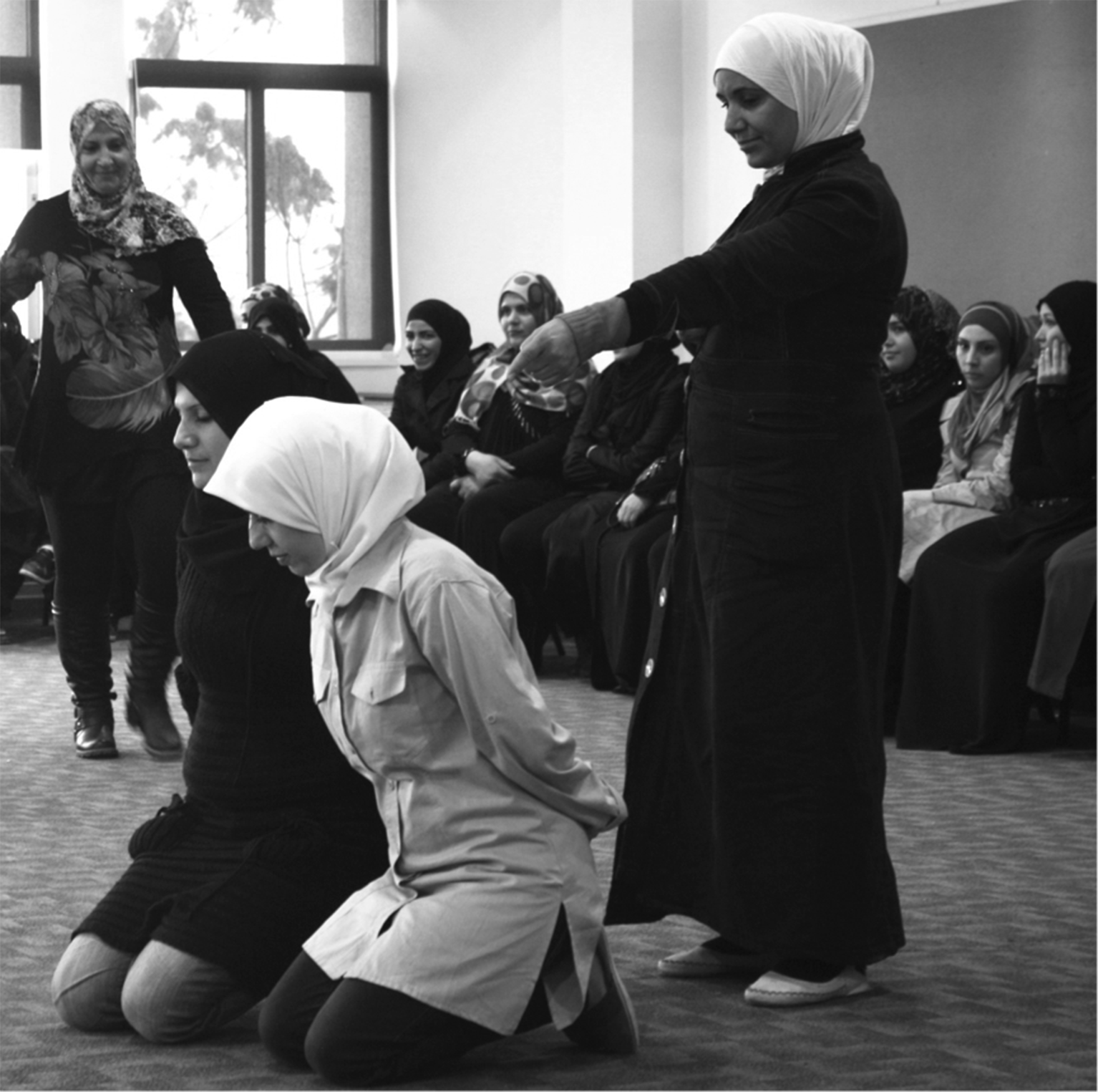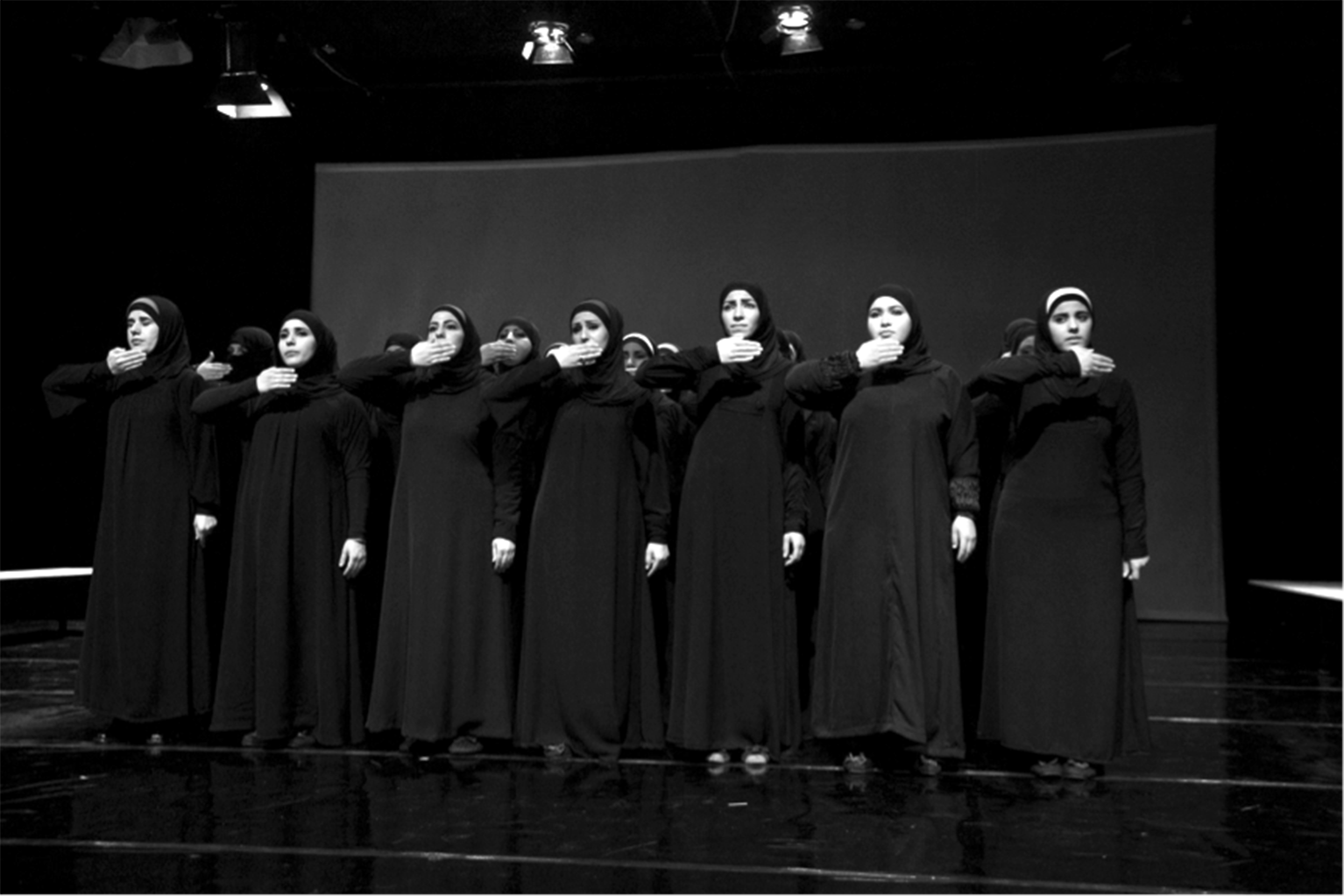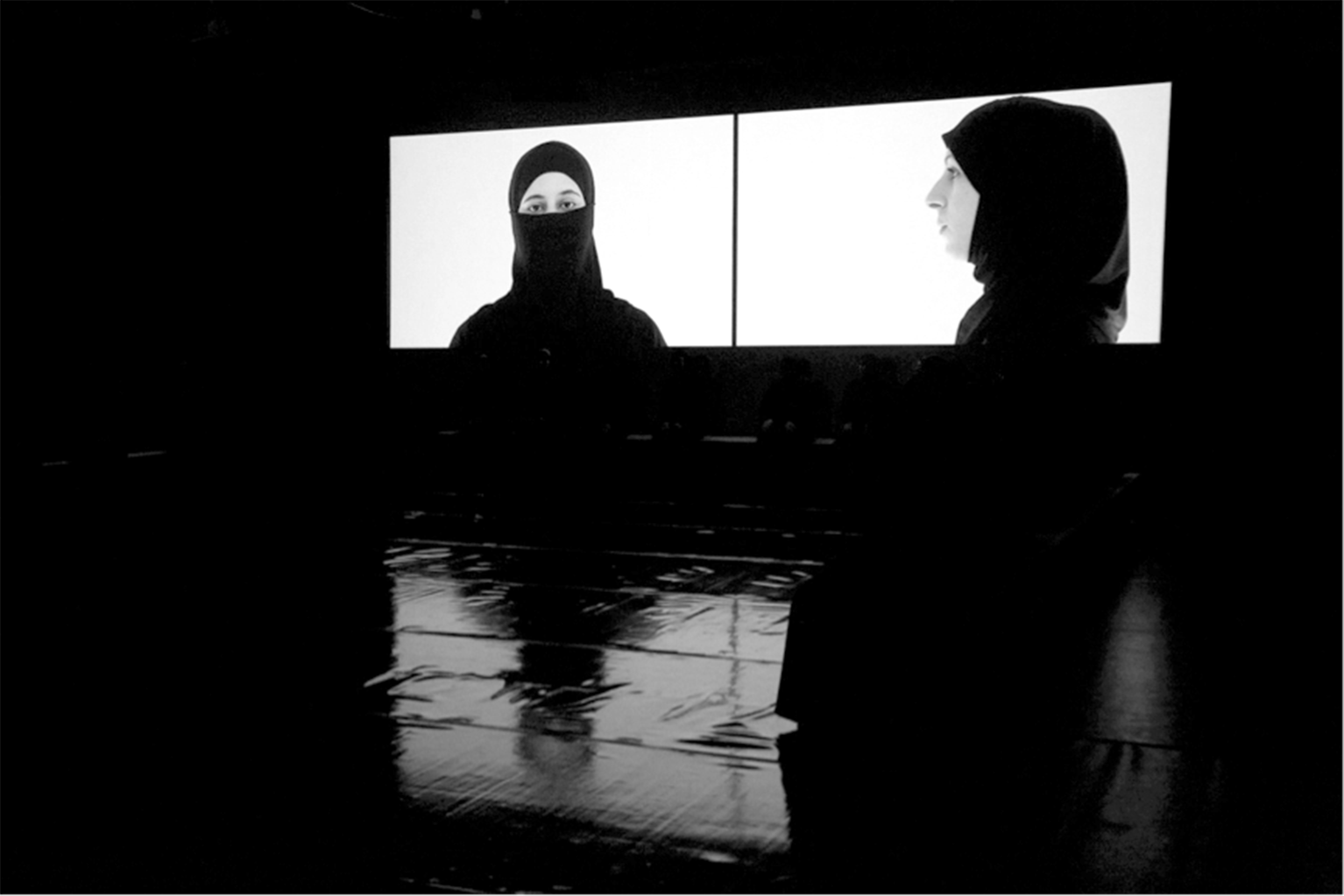It is October 2013. I am in the back of a Jordanian taxi, national radio pumping out all our adoration of the Hashemite dynasty, searching for the tower blocks and alleyways where the Syrian refugees live. I am going to convince them to be part of a theatre workshop. I know it’s not going to be an easy job.
No one acts in Syria. Certainly no one outside a jealously guarded inner circle of the equally exclusive secular elite, and I wasn’t going to find many of them living six or seven to a room in Amman. Most of the families who fled the war and are now surviving as refugees in Jordan are members of Syria’s deprived and voiceless majority. I also knew that in the towns and villages they called home, a woman doesn’t expose a hair on her head outside the house, let alone bare their souls on stage to a bunch of foreigners.
Two months earlier a mutual friend had put me in touch with Charlotte Eagar. We met in leafy Kensington, London, amidst the spoils of her garlanded career as a foreign correspondent at the Sunday Times and The Observer. She’d given all this up to join her husband and partner, Willy Stirling, in a project to reinvent themselves as film producers. Their plan was to follow up the success of their first film, Scooterman, with a re-imagination on stage and screen of their great passion, the tragedy of Euripides, through the eyes of the women of Syria.
Back in the 1990s Charlotte was dodging bullets in Bosnia when she heard a BBC radio production of the Trojan Women, a play Euripides had written in 415 BC, the year after his fellow Athenians had laid waste the Aegean island of Melos, murdered every male inhabitant and taken the women and children prisoner to serve them as slaves. As a distant mirror to the horror of his own times, Euripides held up the suffering of the mythical women of Troy. Some 2,400 years later in 1992, Charlotte had seen in that same mirror a reflection of scenes she had witnessed in the Balkan wars. And now the same thing was happening where I come from, Syria.
Nine weeks later we were out there trying to make it happen. My co-producer Hal and I had only to find a theatre, a rehearsal venue, a director, an acting trainer, a writer, and at least thirty scared and vulnerable women prepared to trust us to transform them over six weeks into the queens and princesses of ancient Troy.
Oxfam provided us with a list of women, selected according to some mysterious, possibly entirely absent, logic, who they thought might be interested in the project. I called some of the Syrian activists working in Jordan and Hal and I decided to camp out outside the UNHCR registration centre, as it was a good place to meet many Syrians queuing to be registered.
The first family we met were living in Sahab, an unsafe area on the outskirts of Amman. The family described it as a ‘drug land’. Maysoon had fled from the suburbs of Damascus with her two sisters and their families after her husband, a former officer in the Syrian army, defected and joined the Free Syrian Army.
Despite what they’d been through, they were all jokes and open minds. When pushed, though, Maysoon admitted their lives were painfully empty. She had lost her job and her home and she had been forced to marry her daughter off to a man twice her age. They had no money. She was feeling numb and completely broken. But she loved the idea of the play. She told me she could see it would give her an opportunity to speak her mind and engage her soul. Maysoon and her sisters never missed a day in the workshop and threw themselves wholeheartedly into every minute.
We spent two weeks forcing down litres of sugary tea and coffee, trying to bring around woman after woman to the project, and of course their husbands. This resistance was always inevitable. Arabs everywhere might lap up the soaps and costume dramas churned out by the Damascus studios, but away from the red carpets of the capital, in Syria’s rickety suburbs and villages, it is a different prospect for a woman to put herself in the spotlight. There are dangerous implications of mingling with strange men and, worse still, exposing yourself to crowds of them in public. How, also, was a wife and mother going to keep putting food on the table and clean clothes on their children’s backs, hard enough under the circumstances, with this added distraction?
The women themselves were obviously enticed. They liked that someone, a great playwright even, thought women’s suffering worth writing about, and to be asked by these exotic newcomers to add their own voices. And that couldn’t help but turn their heads just a little. But still a lot of women found it hard to believe that acting in a play was likely to change anything in their lives; and as time went on even I began to lose faith that it would.
I left Syria in 2011. I had been back once or twice, and I’d seen the situation around my family deteriorate. But we, thank God, have been spared the worst of it. In Jordan, in just a few days, I visited scores of families devastated in some of the worst ways imaginable. I sat for hours with families no different to mine, but in these families there were gaps where brothers, fathers, mothers, children once sat. And those who had made it to these sad lodgings were only telling me part of what the bereavements, the destitution, and the rapes had done to them. As each day passed, the more our noble goals seemed to fade into insignificance. What was I doing there trying to convince people to be in a play when all they needed was a blanket? Emptily, I tried to explain the psychological value of participating in such a project, but the truth is their focus was on how to survive till tomorrow.
According to the UNHCR, Jordan had received some 600,000 Syrian refugees by March 2014. In Amman, tens of thousands Syrian families are living in tiny flats with tin roofs: no heating in winter, no light, no nothing. Most of them do illegal work and live in endless fear of deportation back to Syria, with only the brutality of a merciless regime to meet them.
We were offering six weeks in a room doing vocal exercises and reading an ancient Greek play.
Still, after seeing over seventy women I managed somehow to convince twenty-five to come to the rehearsals. I said to them, ‘just come on the first day and see whether you like it or not’. The clincher for most of them was the safe neutral venue – a community centre – that we found for rehearsals and the nursery for their children; it would have been impossible without it. In the first few days we had children running around while their mothers compared notes on how they’d fled Syria.

Everyone’s darling was Sham, three-months old and good as gold, the company mascot, who somehow slept through the sack of Troy and the rampages of the Greek army day after day. Where I come from, we believe in past lives, and I have no doubt she’d been in the theatre before. Her mother wanted so desperately to be part of the play she would be breast-feeding her in the break or between rehearsals.
We started with exercises. The women loved it. ‘What could be better than free exercise?’ they winked. Nanda Mohammed, the acting trainer, went through her repertoire of rehearsal games, the first any of them had played since childhood. Playground rivalry instantly set in jokes and banter. They had a go at designing their own costumes alongside Bissan Al Charif, the set designer. Of course most of them came up with perfect eighteenth century Disney princess dresses. It was not an easy thing to let them down on that one.
We were all taken aback by the passions we had unleashed. There was hardly a late arrival, let alone a no-show. They loved it so much that they refused to miss rehearsals, even on days when a biblical snowstorm put Amman on hold. For them it was more than a play, it was a lifetime achievement. They wanted to do it well.
And at the end, of course, lay the terrifying and exhilarating thought of the performance.
They wanted, with a passion that stunned even me, to send a message, to tell their own stories in their own voice. And they felt appreciated. They felt important. For the first time in their lives they were being asked to do something intellectually challenging. They were given the freedom to say whatever they wanted, and they found that their opinions mattered.
The workshop helped them organise their thoughts. Helped them feel energised and alive again. ‘I have something to wake up for in the morning’, Raneem told me.
In the last week of the workshop, Nadine came up to me with teary eyes and said ‘This is the best thing that happened to me in my entire life’. I asked her why. ‘Because I feel human again’. And they weren’t the only ones affected. No one walked away from those six weeks unchanged. Working with those women gave me a different perspective on my own country; it also changed my perspective on the war itself.

For the first eighteen years of my life I grew up in a village near Sweida, a predominantly Druze province in the south of Syria. My parents weren’t rich, but they were liberal and secular. Opportunities to mingle freely with the women from the conservative villages near ours were few and far between. I went to study English in Damascus and it was there that, after graduation, I took my first steps in a media career. In the years that followed, I spent most of my time with liberals and wannabe bohemians like me. I look back fondly on those dreamy idealistic years, but with hindsight I see the price we paid was an ever-widening gap between our lives and horizons and those of ordinary Syrians.
In pre-revolutionary Syria a clear separation of class existed between the sophisticated educated elite and the rest. The cultural scene in Damascus and Aleppo, the two largest cities in Syria, was exclusive and detached. Time and time again, I came across attitudes that viewed the ordinary Syrian as a threat, an embarrassing non-initiate in the international art world whose acceptance the elite craved. I remember being haughtily denied funding to take a massively popular electro-folk band from Dara‘a on a tour of Europe, but pointed in the direction of the national philharmonic. And the vaults of the National Film Organisation heaved with thoughtful films lauded on the festival circuit, which were never allowed to see the interior of a Syrian cinema.
All of this, of course, was part of an attitude and a strategy enacted with ruthless efficiency by the regime against its people. Who could wish the overthrow of these socially liberal and outward-looking people by uneducated, socially conservative peasants? Never mind that it was precisely those liberal people who kept the rest uneducated and impoverished. The average Syrian sensibly kept himself to himself. It’s ironic that it took the horrific trauma of civil war to bring these distinctions to the fore.
Over six weeks of intensive training and activities, rare and beautiful cross-cultural friendships began to blossom between the theatre professionals and the ordinary women, who now had a shared goal as well as a shared exile. I enjoyed being transformed by them and watching them transform every day. Without a doubt the experience has enriched my life. Fatima, Maysoon, Nadine and the others gave the lie to every stereotype I have ever heard about conservative women. They were eager to learn, enthusiastic, and they broke barriers. They were strong, they were eloquent.
‘In Syria we were looked down upon as hijabi women. Have you ever seen a hijabi presenter on TV or a hijabi actress? Never!’ More than anything, Nadine told me, she was grateful that we gave hijabi women an opportunity to act.
I still sometimes find it hard to justify spending thousands of pounds on a theatre project while some Syrians are being starved to death. But projects like these bring genuine psychological help to a large group of people in a short and effective way, which in turn, we can only hope, will have a long-lasting effect on their and their families’ well-being. Everything in a Syrian family revolves around the mother, and we want psychologically healthy, ambitious, fulfilled women to pass the benefits onto their children and therefore to society at large.
For me, the most important achievement is that we managed to bring theatre to a class of people that have never seen, never even read a play, let alone acted in one, a tiny rectification of a tiny fault representative of so many that was not theirs but the fault of Syrian society and the Syrian regime.

Finally, the women’s ability to be at peace with each other despite deep differences in political opinion gave me new hope for Syria – not the Syria we live with today, torn this way and that between fighters arriving every day from Iran, Lebanon, London and Baghdad. We’ve lived with our own leaders and outsiders reminding us of our divisions, but it only takes a few weeks rehearsing a play to remember what makes us all human.